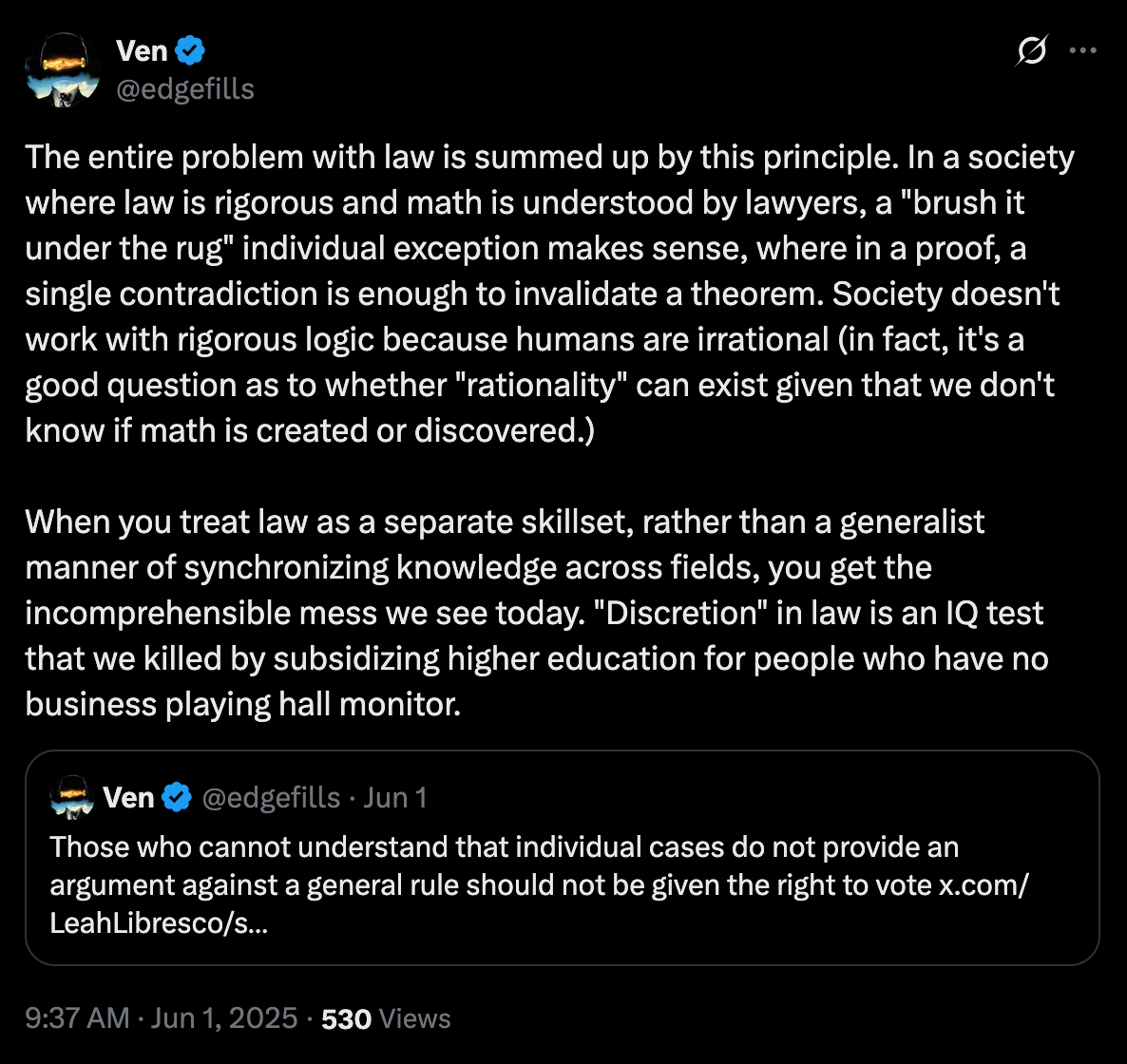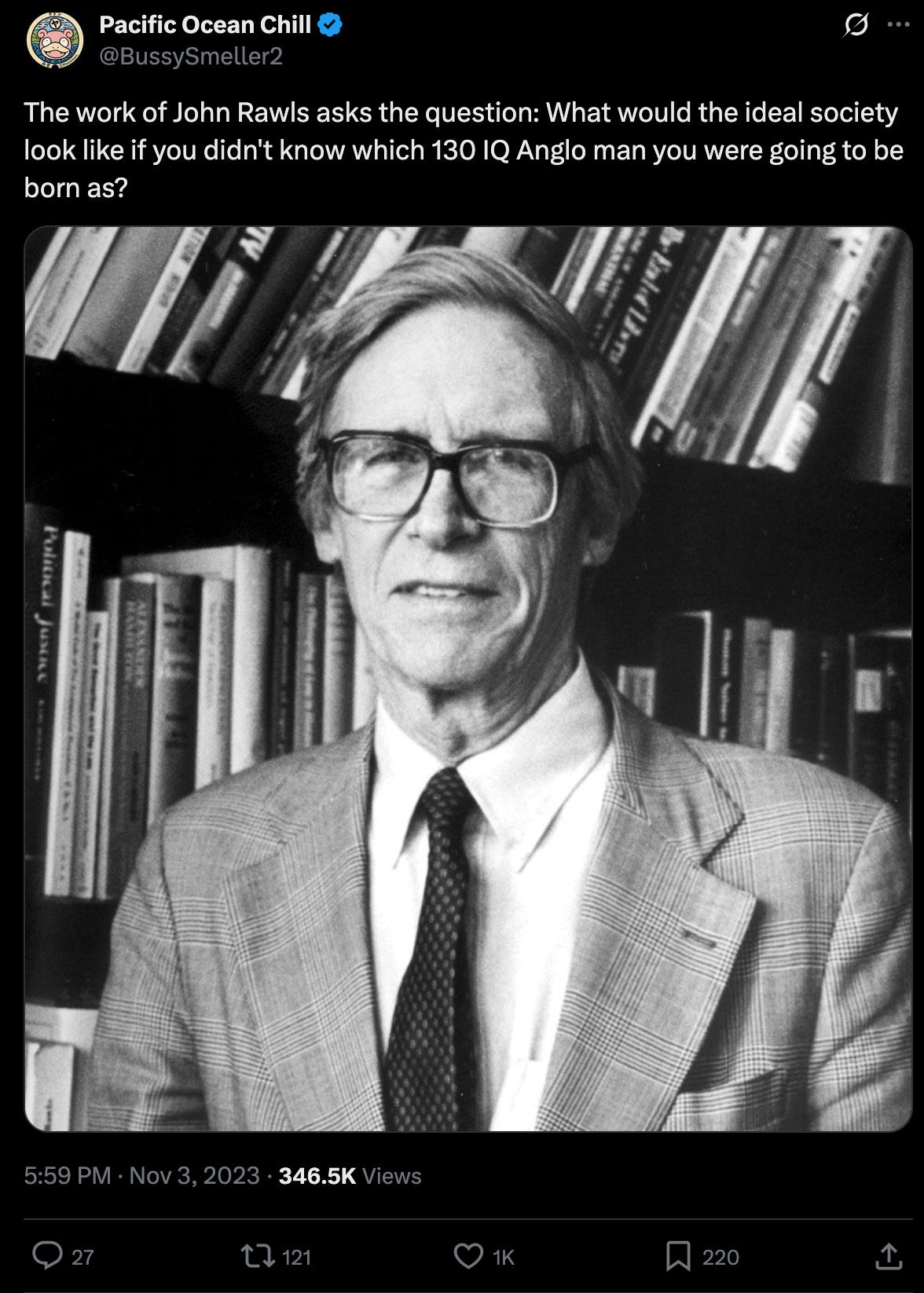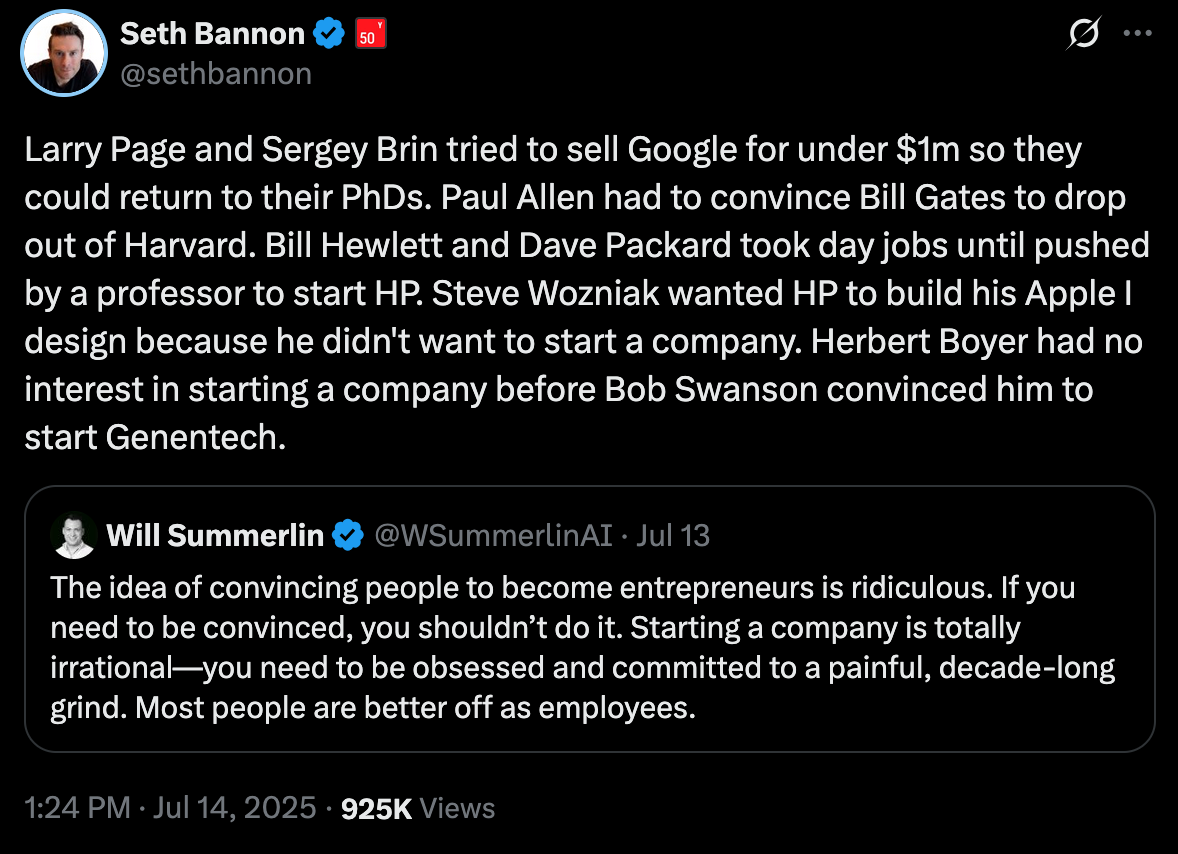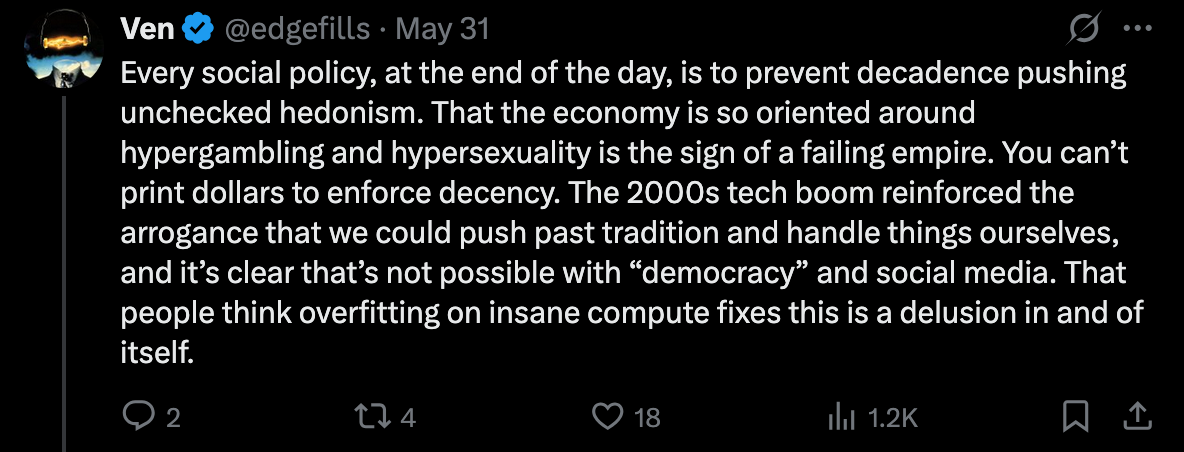The Delusion Factor
On personal growth, ambition, and life satisfaction
There’s a concept I invented a while ago to aid my own life planning called “the sliding scale of afterlife”. The gist of the concept revolves around assessing how much agency your future actions might require: am I focused on doing things in my life, in the present, or am I content with letting things play out and focusing on living virtuously, while taking things as they come?
Obviously, this is not a stagnant balance — as much as I love talking to devout, content people, dare I say, the lifestyle is kind of boring when you’re entirely focused on what comes after rather than what comes next. On the other hand, when you attempt to impose your will on the world without considering the tradeoffs, well, this is how you end up on the hedonic treadmill.
There’s an old saying — “there are no atheists in foxholes” — that got translated into a modern day trading joke,
and it’s one of the truest statements I’ve ever read. Notably, praying for a trade to go my way has never worked out, but consider this story from my early 20s:
Idiotically, I decided that I could spend the entire flight trading on the way to Singapore off the plane wifi. Needless to say, the connection over the deep Pacific is not particularly stable, and I found myself using an IRC ticker bot to get prices to place orders through my ThinkorSwim phone app, because the quotes wouldn’t load on the app itself. Somehow, I made it through the flight in the green…
The degeneracy didn’t stop there. During that entire stint in Singapore, I was trading round-the-clock futures at an 80 VIX prior to margin changes. Yes, I was running around trading 100 /ES contracts with a bank account modestly in the six figures. You can imagine what came next:
Trading undoubtedly induces adrenaline when you have a position in it. Stocks don’t have enough leverage to induce the thrill that a volatile options trade might. But the downside to an adrenaline-inducing activity is it can get addictive fast, especially when you have products like crypto or futures that trade around-the-clock. You find yourself chasing that hit of an 80 VIX like a Red Bull sponsored skier chases that god run from the pristine mountain peak.
To say I was taking “risk of ruin” would be such an understatement that even the English of yore would object to the categorization. Needless to say, after a week of reaching Valhalla and nearly blowing up every 40 minutes, I permanently fried my adrenaline response, which, in a sense, might have been the best thing that ever happened to me trading-wise, and markedly shifted my views going forward.
As many talented STEM kids do, I very much grew up an atheist, particularly amplified due to being immersed in the British tradition. You don’t exactly grow up reading Hitchens, Orwell, and Kipling without developing a skeptical viewpoint, and given that my technical backdrop came in the wake of the great achievements of the 1900s, it’s easy to think that science, math, logic, and reason can solve the world when you’re in the spongebrain phase of life. Especially when most of the context of religion came from identification for political purposes, the stuffed-shirt conservatism of the 2000s did not seem like a model worth perusing. In any case, it’s good to set the slider to “100% focused on now” while you’re still exploring and developing skills — I look back at how much I achieved by the age of 17 and I’m still shocked at exactly how much I managed to do.
With that kind of intellectual background, and many years spent chatting and debating on forums I was definitely too young to openly be a part of, “conservative” thought came quite naturally as I went to college. Other than the brainwashed, nonsensical political labels, here’s how I define the terms “conservative” and “liberal”:
The quintessential difference between a conservative and a liberal in my framing is how they ask the question “why”. The conservative frames their thought around limiting hedonistic behavior, in a “look before you leap” sort of pattern: “This makes me feel good, why is this the case? Should I continue this course of action?”, while the liberal frames their thought around negative stimuli: “This makes me feel bad, why is that so? What should I do to fix this?”
Both approaches can be applied in an intellectual fashion, but conservative thought naturally lends itself to abstract, scaled structural thought — the concept of “rule of law” with a discretionary bypass is such a brilliant idea being ruined by people incapable of understanding the ontological responsibility of being a human applying it — while liberal thought is much more reactionary (and therefore dynamic), but consistently fails to account for second-order consequences as it’s based around an individual manner of thinking, and almost all humans are incapable of scaling and extrapolating derivative effects in a coherent manner.
You can truly tell that I was authentically 13 going on 30 by my, er, distaste for my college peers. When I went to college, I assumed people would be smarter than my (admittedly ultra-high achieving) high school classmates, and was bitterly disappointed outside of the math department.
People are only seeing it now when an NYU or Stanford Law kid sends out a dumb unprofessional campus wide email (and this is perfectly fine), but it’s tacitly supported by the past decade of graduates who all have the elite appeals roles…
Every conversation without a known party was a litmus test. Even then, you could get in trouble if the wrong group judged you. It wasn’t debate, it was apparatchiks enforcing an ideology. This is a very common experience amongst all my similar-aged successful friends…
You used to just be able to shut your mouth and go on, and a lot of people did. But it’s become harder and harder with how kids only interact online nowadays. Nobody noticed until it affects them (Elon, Bill [Ackman]).
Early freshman year I got shouted at to check my privilege in a casual convo about majors and courses where someone was upset I had no trouble registering bc my major wasn’t as high in demand. It was a factual observation — what organic thought/debate was there? It’s programming.
This requires a bit of internet history to understand, bc a lot of freshmen women around my time came in with preconceived Tumblr-left notions. Way more women go to college than men, and this has only accelerated. Tumblr culture was pretty vindictive — pseudonymous, not anonymous — if you got called out by a certain following. On forums/irc, you just logged off or went elsewhere. Tumblr people didn’t do that, it was all name and shame. YA fiction culture (all adults) is an offshoot of that. Kids who go to private/elite public schools are overwhelmingly from UMC backgrounds or better. They all grew up with laptops and Tumblr the way I grew up reading /lit/. There was a much higher % of kids with very strong opinions who recreated their internet environment. You see it with the terminally online industries like AI and crypto as well (~ed. and it’s evidently clear how incompetent they are at traditional, “irl” socializing.)
Then social media warped heavily into a pure psyop around the time the_donald became huge. Every single forum was astroturfed. Organic content basically got privatized overnight. Most people aren’t as quality-sensitive or careful about thresholding info as I am and got programmed. This should be obvious to people who kept their sanity during 2020 while everyone lost their minds around them. Normal people are extremely susceptible to online influences. Unless you spent time on the early internet you don’t even notice it.
Observing all this well in advance of current-day mania formed a couple of core beliefs of mine. First, I concluded that the form of “socialism” espoused by the likes of Orwell and Einstein amounted more to a belief that, as intelligence in society progressed over time, an egalitarian society would resemble a socialist one.
Indeed, when the rule of law was insulated from the masses, the concept of governance from the implications of it worked beautifully. The modern-day adversarial system, a chore to navigate, is the polar opposite of the symbiotic system that arises when deterrence is properly understood. Consequently, I enshrined a core principle in my thought:
If my solution to a problem amounts to “people have to be better”, it’s no solution at all.
This lends itself to some pretty interesting corollaries/derivatives, namely that in many more situations than you’d think, it’s appropriate to do nothing (which is precisely why liberals in particular are never capable of understanding that you can’t legislate in social change), but more importantly, this idea that humans are inherently unfixable and flawed frames agnosticism in a particularly interesting light.
The “godless” interpretation of this statement lends itself to jaded cynicism if you are unable to stop caring about the world, or a survivalist nihilistic outlook
While the term is commonly assigned a relentlessly negative polarity, I’d call the most prevalent strain as presented in Russian literature as, “such is life”. By assuming no greater meaning, one is imbued with a shocking ability to make real-time decisions…
that comes when you’re able to handle the existential dread of “dooming” and keep your head up to profit-max.
If you are a doomer, and I frequently claim I am, the proper trading strategy is to be aggressively bullish. Betting on the downside is dependent on luck, and is fundamentally antisocial. This is (partly) why I hate Michael Lewis and the big short, and what tech people don’t understand — getting rich quick is also antisocial. Wealth must be earned, and cashing out when the facade gets eviscerated (and, let’s be clear, most wealth is a facade) leaves a bad taste in everyone’s mouth. Everyone with a brain saw it coming, but they tried to stem the panic, because shorting is a self fulfilling prophecy. Markets don’t crash due to sellers overwhelming buyers, but complete lack of bid — aka no liquidity in the underlying. That’s what “don’t dance” means, that Brad Pitt was saying. Making money betting on big crashes is like making money on a crypto rug. You’ve won, but at what cost? You’ve ostracized yourself from the rest of the decent world…
Note that, of course, a jaded cynic would not care about ostracization, which is precisely why they’re able to even attempt “the big short.”
The stresses of pandemic volatility and staying rational during the mass psychosis events of 2020-1 pushed me to reconsider, once again, how I framed my thought. And, much like Turgenev’s Bazarov, romance played a large role in reshaping my perspective.
Nowadays, I’m fond of saying that I don’t believe in coincidences:
A question I frequently ask people is whether they believe in coincidences, because I don’t. Definitionally, this prevents me from being a nihilist, and I think that’s where a lot of my prognostication ability comes from — of course, I believe most people are stupid, incompetent, irrational, whatever, but I don’t think they act meaninglessly…
This is partly due to the fact that my brain is one of the most powerful pattern-recognition machines in the world, and I trust my intuition 100% when it tells me to believe in variance rather than rationality, data, and logic. The emotional framing, however, comes about when you start to think about what a relationship with a significant other is — the “future” stops being this ethereal concept that justifies an immediate, “take it as it comes” approach and morphs into a sort-of indefinite highway with sights, scenes, detours, and a potential destination to take into account. (Of course, sometimes there are roadblocks and you’re forced to take an exit, but that’s a story for my memoir.)
Once the slider starts to drift away from wholly focusing on the present, the idea of guidance from a higher power seems more palatable due to the sheer mental effort it takes to meticulously calculate out the future (a task that’s much more complex than calculating 10-deep chess variations, which most people can’t even attempt.) And once you start shifting away from godless thought, my “core” statement starts to sound awfully Calvinist when you think about it: we do not know whose lives we can improve, but we must make a concerted effort to do so, until we know it is futile, to live virtuously ourselves. The path forward, then, seems disconcertingly simple: reduce variance, settle down, and improve the lives of the people around you in direct, noticeable ways, rather than caring about vague conflicts and “wrongs” that cannot be righted in a directly resolvable manner. The slider moves firmly towards the “afterlife”: progeny becomes the priority and you set your minivan to “cruise control” on the highway and live “happily ever after”.
And, in a sense, this is what I spent the past couple months thinking about — whether I’m truly capable of being content with my achievements as an individual and shelving the desire to leave a legacy in my own name. So color me surprised when I saw World Golf No. 1 Scottie Scheffler basically echoing my own internal monologue:
I think it's kind of funny. I think I said something after the Byron this year about it feels like you work your whole life to celebrate winning a tournament for a few minutes. It only lasts a few minutes, that kind of euphoric feeling… And you win it, you celebrate. You get to hug your family, my sisters there. It's such an amazing moment. And then it's like, OK, now what are we going to eat for dinner?
You know, life goes on. It's great to be able to win tournaments and to accomplish the things I have in the game of golf ... it brings tears to my eyes just to think about, because I’ve literally worked my entire life. To become good at the sport and to have that kind of sense of accomplishment is a pretty cool feeling. You know, to get to live out your dreams is very special."
But at the end of the day, it's like, I'm not out here to inspire the next generation of golfers. I'm not here to inspire somebody else to be the best player in the world, because what's the point?
This is not a fulfilling life… It's fulfilling from a sense of accomplishment, but it's not fulfilling from a sense of the deepest places of your heart. There's a lot of people that make it to what they thought was going to fulfill them in life. And then you get there, then all of a sudden you get to No. 1 in the world, and they're, like, what's the point? I really do believe that because, you know, what is the point? You are like, what? Why do I want to win this tournament so bad? That's something that I wrestle with on a daily basis. It's like showing up at the Masters every year. It's, like, why do I want to win this golf tournament so badly? Why do I want to win the Open Championship so badly?
I don't know, because if I win, it's going to be awesome for two minutes. Playing professional sports is a really weird thing to do, it really is… When I sit back at the end of the year and try to reflect on things, like having that sense of accomplishment from winning the Masters Tournament, from winning the PGA Championship, I have a deep sense of gratitude and appreciation for it, but it's just hard to explain how … it just doesn't satisfy, is how I would describe it. It's an unsatisfying venture.
I guess what I'm trying to say is this is not the place to look for your satisfaction. This is something where you can have a great appreciation for and a great amount of thankfulness for being able to do this. Like I said, it's literally one of the most fun things I can do in my entire life. I love being able to come out here and compete. But at the end of the day, it's not what satisfies me, if that makes sense.
It is so, so funny to me that Scheffler — barely older than me — also framed this kind of existential questioning through the game of golf, though he hits his 7-iron a little better…
Golf, fundamentally, is an elaborate way to kick rocks. (Indeed, I’m sure the origin story is something along the lines of Grug being bored in Scotland in the 1400s and hitting a rock with a stick.) This is further evidenced by the fact that a great golf course design loops — the 18th green ends up right by the clubhouse and the first tee, right back where you started. You take your hat off, laugh a bit at a rehearsed joke, shake some hands, and then go on your way.
When you don’t know you’re in the loop, you can enter “the zone”. I’m sure the reason why I initially got so great at chess, then at trading, is because I could ritually perform the same activity in an endlessly variable (yet contained) manner and apply incoming information to modify the efficacy that I threaded the loop with.
What spoils the loop is perspective. When you know that you’re playing a board game with no meaningful reward, it’s impossible to properly apply pressure to motivate yourself to find the best move in a position. When you know that you’ve reached the limit of noticing the number going up in your bank account — the studies stating that “increased salary does not bring happiness” are absolutely true, just look at where people predictably hop off the salary/self-improvement treadmill — mispricings stop looking like opportunies and instead look like crippling social idiocy that you can’t just go and fix yourself…
It’s an extremely difficult question to answer — where does the motivation come from after you’ve built up some perspective?
This is where the delusion factor comes in — when you “have it all figured out”, the only way to change reality is to delude yourself into thinking you can do so. There’s a myth in the hustle-startup-grindset culture that entrepreneurs are born — much like great leaders, a lot of the best ones are reluctant to enter the fold:
“Just when I thought I was out, they pulled me back in” isn’t as pretty of a story, but it takes a severe amount of delusion to pull the slider back from the steady, predictable highway route and veer off to the right at the potential cost of your health, your financial stability, your relationships, and more to chase the possibility of turning a vision into reality.
It’s why the venture capital class (at least the skilled ones) can tell when someone has that level of delusion, and why it can also misfire at epic proportions (from Macbooks vs Wristwatches):
The MacBook class fails to understand that what the wristwatch class values is the people who can delude themselves into thinking they can change reality and are willing to spend all their time and effort working towards it. It’s so hard to sell a vision and raise money. I’ve probably met 50x the amount of people with good ideas than I’ve seen able to raise money. It’s so hard to find the right people, get out of their way, and make the executive decisions when they come up. Sure, the “genius engineer” thing is a meme, but he doesn’t need to be the guy designing or building the rocket, but rather visualizing how it all fits in to a business strategy and turns into a stable company 5 to 10 years down the line. It’s why, despite how much I despise this happening, it’s perversely understandable why Adam Neumann was able to raise money again. That particular group of the wristwatch class — venture capitalists — understands that it’s about setting money on fire 90% of the time. Someone who has at least shown the ability to scale could at least be somewhat argued to have “learned” from the last time they incinerated all the capital vs an unknown quantity. Given all that money for leases, you or I would be haggling over getting a deal, not buying the market top, worrying about finances, and more. All good instincts to have! At the same time, when you’re given the license to grow, you have to go for it as much as you can. Adam Neumann was human vaporware, but his ability to understand that building a lucrative business requires denying reality to a certain extent was pretty sophisticated.
(Postscript: the reason why I call the investor class “wristwatches” is twofold. One is because mechanical watch owners aren’t really concerned with efficiency, are they? The nicest Lange is less accurate than a $10 quartz Mickey Mouse watch. The other is due to how watches appreciate in value — take the Paul Newman Daytona for example. Functionally, it’s the same as any other Daytona — a watch that retails for around mid 5 figures — but due to the story behind the watch, it sells for roughly $18 million. The story itself multiplies the value of the same watch by 360x, which I think highlights the essence of how you understand the wristwatch class and, consequently, how you raise money from them.)
Delusion without grounding results in mania, or worse, especially if it results in success,
while grounded delusion feels like a “higher calling”, that you’re immune to the cold grasp of probabilities, and the law of large numbers — that you are the individual exception that statistics do not apply to. And when you understand the pattern, you can do it again, and again, and again.
That being said, the most common advice I give to budding founders is “you don’t need a startup, you need a wife.” Perhaps the actual delusion present is the thought that I can do both.










Splendid work as per usual.
“If my solution to a problem amounts to ‘people have to be better’, it’s no solution at all.”
If only more people understood this.
“That being said, the most common advice I give to budding founders is ‘you don’t need a startup, you need a wife.’”
Yeah… in retrospect, this applies to me. Damn.